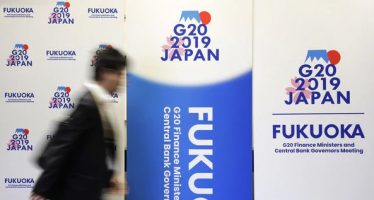John Gandolfo, IFC’s Treasurer: Looking Towards Recovery from Covid-19 and a Green, Resilient, Inclusive Future

Author: John Gandolfo
The Covid-19 crisis has impacted the health and livelihoods of many millions of people across the planet, and it continues to impose an enormous toll on the poor, threatening decades of progress towards raising living standards in the developing world.
Massive unemployment generated by the spread of the pandemic highlights the importance of jobs and economic transformation, and it also puts added urgency on gender and development. Maintaining a strong focus on climate change is critical to long-term goals.
More than ever, innovative solutions are needed to bridge the estimated $2.5tn annual funding gap so that the world can meet the 2030 development goals.
This means turning the billions now invested in sustainable, green, and socially responsible finance into the trillions required if we are to end poverty and boost shared prosperity.
We must dramatically scale-up investments in sustainable finance in this decade, and sustainable bonds can help us get there – offering an important avenue to raise funding in large volumes.
Sustainability is embedded in IFC’s DNA, including its funding programme. Every year, IFC borrows around $14bn in the international capital markets to fund loans to clients. We have two established thematic sustainable bond programmes: green and social. Around 20 percent of annual funding is issued in such bonds, the proceeds of which fund eligible projects from IFC’s loan portfolio with clear environmental or social benefits.
IFC was one of the earliest issuers of green bonds, launching a programme in 2010 to help catalyse the market and unlock investment for private sector projects that support renewable energy and energy efficiency. Since then, IFC kicked off the mainstream green bond market with two landmark $1bn issuances in 2013 and has now issued over $10bn in green bonds.
Similarly, IFC has also been a pioneer of the social bond market, issuing social bonds in both public and private markets and in various currencies since the Programme was launched in 2017 in alignment with the Social Bond Principles. IFC has now issued over $3bn in social bonds.
In March 2020, we issued a $1bn social bond which supported IFC’s $8bn Covid response package. With a final order book of over $3.4bn, the deal was well received in the market and is a testament to investors strongly supporting the alleviation of social issues.
In addition, IFC plays a leadership role in developing guidelines to grow the sustainable bond market; we have been actively involved in various initiatives to promote ESG integration.
We chair the executive committee of the Green, Social and Sustainability-Linked Bond Principles. Under IFC’s leadership of the Principles, the Green and Social Bond Principles were updated in June, representing a significant positive development for sustainable finance and the transition to a low carbon economy. The expansion of these principles will help increase transparency and impact reporting. And to foster the growth of the nascent sustainability linked bond, the Executive Committee published guidelines on selection of key performance indicators (KPIs).
This past year, as complex social issues arose directly from the turmoil of the pandemic, social bonds came to the fore. IFC has played a role in the wave that brought social bonds to investors worldwide, helping women entrepreneurs and female-owned small businesses in need of access to credit. This has also benefitted low-income families lacking quality healthcare and clean water, and smallholder farmers taking their crops to market.
Focusing on social bonds, IFC anticipates the market will continue to grow this year, and if trends continue it could see global issuance exceed $180bn. Surpassing $15bn in cumulative sustainable bond issuance is possible by the end of the year. The project pipeline dictates the issuance and we have seen a healthy and growing pipeline of projects that sustainable bonds will finance, notably around the Global Health Platform and Covid packages that could be potentially supported by Social Bond Programme.
IFC launched the $8bn fast-track Covid-19 facility in March 2020 to provide liquidity to its existing clients, both for financial institutions to on-lend to SMEs and women. We committed more than 50 percent of this facility to benefit the poorest countries and conflict-affected states, and also launched the $4bn Global Health Platform that allows investment in companies to increase the supply of critical medical supplies to developing countries, including face masks, ventilators, testing kits, and vaccines. The senior loans made as part of these programmes are potentially eligible for social bond financing.
The new Base of the Pyramid Programme, meanwhile, will provide up to $400 million to microfinance institutions, non-bank financial institutions, and banks that are focused on micro, small, and medium enterprises (MSMEs). The program will be available to new and existing IFC clients.
Besides the surge of social bonds, transition bonds received attention from the market, driven by the publication of the Climate Transition Finance Handbook by the Executive Committee of the Green, Social and Sustainability-Linked Bond Principles.
The sustainable bond universe is expected to continue to grow, with issuance this year surpassing the same period in 2020.
As investors become more aware of the phenomenal challenges we face as a planet, they demand sustainability be embedded in investments and consequently more are stipulating parameters on their capital finances. At IFC, green bonds and social bonds are critical to stimulating the supply and demand of funding to achieve the SDGs and other sustainability goals.
After more than a year of Covid restrictions, it is tempting to talk about returning to normal, but for some people that means living without access to services, below the poverty line. The pandemic has revealed the lack of resilience in the “old normal”. Across the globe, we have all being affected by this.
This time, we can rebuild better.
Since climate change impacts, which have been compounded by the pandemic, necessitate an exceptional and urgent response, IFC will prioritise climate change mitigation and adaptation as the underpinnings of a durable post-pandemic recovery. In line with the World Bank Group approach, it will seek to promote green, resilient, and inclusive development.
ESG is at the core, which is why IFC was the first issuer to systematically integrate ESG considerations into underwriter selection. An ESG dealer survey has more than doubled in size in its second year, with 46 sustainability questions sent to more than 60 banks. Under the expanded survey there are new questions on embedding sustainability and reducing the carbon footprint. Engaging with partner banks is vital as we move forward with sustainable investing for a resilient recovery.
Not only does IFC therefore help set market standards and lead in issuing green and social bonds, we also work with our clients to structure and issue their own sustainability-focused products, and then mobilise our partners to co-lend into them.
Through syndications and mobilisation IFC works to actively attract and support private investors to invest alongside us in developing countries – connecting borrowers to new sources of capital. Our syndications programme is the oldest and largest among multilateral development banks. Utilising a broad suite of products, new partnerships with commercial banks, institutional investors, insurance companies, sovereign funds, impact investors and development institutions enlarge the pool of responsible capital available to deliver positive social, environmental, and economic impacts.
Development banks use the term “mobilisation” when talking about attracting additional capital and IFC has evolved one of the most diversified mobilisation product offerings among its peers. Investment partners can currently participate in IFC originated debt investments using B Loans, parallel loans, portfolio syndications (via the Managed Co-Lending Portfolio Platform, or MCPP), credit insurance, and political risk guarantees. MCPP is a proven platform that gives institutional investors access to IFC’s impact loans, and it has raised over $10 billion to date.
IFC is leveraging its strategy and experience to bring the private sector back to emerging markets to create the economic growth and the jobs that are needed to bring recovery. As it works alongside investors looking for increased positive social impact, IFC is excited to play a role in helping achieve the world’s most pressing development goals.
About the Author
John Gandolfo is IFC’s Vice President, Economics and Private Sector Development (acting) and Treasurer, leading a global team responsible for managing IFC’s financial position, safeguarding the organisation’s international triple-A rating and maintaining IFC’s standing as a premier issuer in the global capital markets.
Gandolfo leads IFC’s Treasury and Syndications global team in delivering on IFC’s strategy to create markets and mobilise private capital for development. The team manages over $100 billion in liquid assets, global market borrowings, and derivatives transactions. It is responsible for strengthening local-currency financing by arranging and executing local-currency and risk-management transactions for clients and raising third-party capital through innovative syndication and mobilisation platforms such as the Managed Co-Lending Portfolio Program (MCPP).
Prior to taking the role of IFC Treasurer, Mr. Gandolfo was Director and Chief Investment Officer of the Pension and Endowments Department at the World Bank. His team managed $27 billion of World Bank Group pension and other retirement-benefit portfolios invested across a range of asset classes and strategies.
You may have an interest in also reading…
Coal, Ja Bitte, Nuke, Nein Danke: Germany’s Other Sort of Nuclear ‘Disaster’ is Unfolding
Coal is a dirty source of fuel, and brown coal is the worst of the lot — yet, as Wim
When Will They Ever Learn? Clearing The Climate Change Roadblocks
A study from Science magazine has offered a quantitative look at the decades-long disconnect between the fossil fuel industry’s “private
The Importance of Promoting Financial Stability and Growth through International Regulatory Coherence
By Nandini Sukumar, Chief Executive Officer, The World Federation of Exchanges One of the World Federation of Exchanges’ (WFE) strategic


















































































